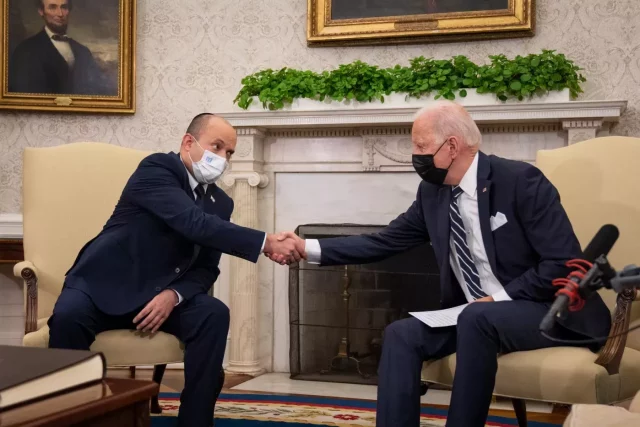
President Joe Biden is planning a trip to Israel, with a possible visit to Saudi Arabia. In his bag is a nice hostess gift—American support for the restoration of Saudi control of two islands near the Gulf of Aqaba, which could help bring the Saudis into the Abraham Accords. A smaller gift for the Palestinian Authority (PA) is a potential visit to a Palestinian hospital on the eastern side of Jerusalem, implying a Palestinian role in Israel’s capital.
But there are times where the presence of the president of the United States can make things worse, not better—where American intervention makes things worse, not better. This is one of those times. As President Biden packs, he should re-evaluate a few of the fundamental tenets of his Middle East policy.
And then unpack.
The administration places the highest regional priority on restoring the 2015 Iranian nuclear deal, for which Biden has made major economic and terrorism-related concessions to the Islamic Republic. This has antagonized, frightened and alienated Israel, Saudi Arabia and the other Gulf Arab states. An agreement on the Gulf of Aqaba islands would be nice, but if the region remains subject to Iranian threat, Houthi missiles and American retreat, it means little.
Mr. Biden’s second priority is restoring the PA and the “two-state solution” to the center of regional American diplomacy. U.S. Ambassador to Israel Thomas Nides said the president “fully and completely believes a two-state solution is best for Israel.” He added that it is “imperative to take care of the Palestinian people,” noting American money poured into “programs for the people. They deserve dignity and security…and a two-state solution.” Then the kicker: “We want to see that neither side does stupid things.”
Speaking of “stupid things,” despite the bipartisan Taylor Force Act, which prohibits American funds from going to the PA while the Palestinians pay “salaries” to terrorists, the 2021 State Department budget included $360 million in U.S. taxpayer dollars for West Bank and Gaza activities.
Increased Palestinian incitement and violence in Israel have been a direct result. The Palestinians—both Hamas and the PA—have no fear that the U.S. will revoke their money or political support.
The administration’s vision is skewed. It posits a Jewish state with a strong minority Arab/Muslim population (Israel’s current non-Jewish population is 21%), plus a Palestinian state which vows to be Judenrein. However, there are four governing bodies in the area of the Old British Mandate for Palestine (Jordan, Israel, the PA and Hamas), any two of which are at odds at any given time. And Israel is a target and a scapegoat for the failings of three of them.
From 1948-1967, Jordan illegally occupied what should have become a Palestinian Arab state. It faced a PLO uprising in 1970 and withdrew its citizenship from West Bank Palestinians in 1988. The kingdom is considered fragile because there are Palestinians who claim all of Jordan, as well as all of Israel. Today, however, Jordan and the PA are combining forces against the threat of Hamas after an unusually blatant show of Hamas violence and desecration on the Temple Mount during Ramadan. It fell to Israel to remove dozens of armed and rock-throwing operatives from the Muslim holy places, thereby allowing tens of thousands of Muslims to pray.
The Jordanian king and the PA blamed Israel for the violence Hamas engendered. The Jordanian foreign minister said the mosque is “occupied Palestinian land and a Muslim worship place” and that “Israel has no sovereignty there.” This is not historically accurate. A post-1967 arrangement under which Israel “respects the present special role of the Hashemite Kingdom of Jordan in Muslim Holy shrines in Jerusalem” was codified in the 1994 Israel-Jordan peace treaty. In the treaty, “Overall security for the site, including entry to visitors and worshippers, rests with Israeli security forces.” Those forces, naturally, belong to the sovereign Israeli government.
Inter-Arab violence and the disposition of armed groups is not accounted for by the Biden plan. The U.S. called it a “cycle of violence” and told “both sides” to behave, as if there are only two, not four — and not do “anything stupid.”
Under the circumstances, nothing the president brings with him can help.
A restoration of the prior administration’s policies on both Iran and the Palestinians would be helpful: removing “incentives” and instituting pressures to change behavior. Sanctions on Iran limited the money available for both Iran’s nuclear and conventional/terrorist spending, while American investments in domestic energy drove down the global price of oil. The Palestinians were offered a seat at the negotiating table only if they entered the peaceful social, economic and security relationships of the Abraham Accord signees.
Those are gifts Mr. Biden could pack in his travel bag and be welcomed by America’s traditional friends and allies in the region. Without them, he’d be better off staying home.





